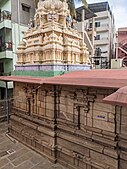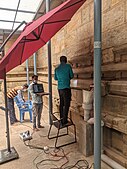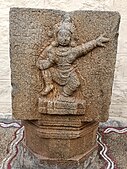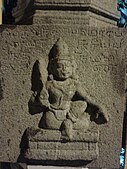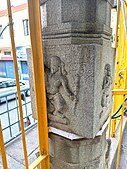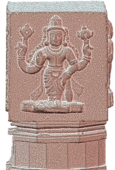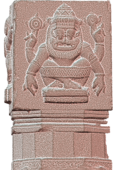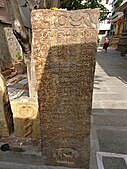Domlur inscriptions and hero stones
This article may require copy editing for grammar, style, cohesion, tone, or spelling. (November 2024) |

Domlur is a locality in the eastern part of Bengaluru city in India. Domlur is a historic places as indicated in the 18 inscriptions spanning the period 1200-1440CE found there. Of these, 16 inscriptions are at the Chokkanathaswamy Temple dedicated to the deity Chokkanathaswamy or the Chokka Perumal [the Hindu God Vishnu]. Of these eleven inscriptions are from the period 1200-1440 CE and have been documented earlier in Epigraphia Carnatica, Vol 9,[1] these are mostly donatory inscriptions for the deity Chokkanathaswamy and for the Someshwara temple (non-existent).
Domlur has been referred to variously as Tombalur, Dombalur and Desi Manicka Patanam in the inscriptions. All the inscriptions barring one are located in the precincts of the Chokkanathaswamy Temple. The earliest mention of "Domlur" can be found in the Chokkanathaswamy Temple 13th century CE Tripurantaka Perumal Enbe Devar Tamil inscription, it mentions Domlur in the Tamil form as Tombalur, proving the existence of Domlur at least since the 13th century.[2] The Karnataka State Gazateer, Part 1, 1990, records the discovery of an 8th-century Bhairava idol in Domlur by S R Rao, renowned Archaeologist of ASI in 1975. This suggests that Domlur may have held significance as a settlement even during that time. Unfortunately, neither the idol nor S R Rao's documentation concerning it can be traced today.[3][4]
Discovery and dating
[edit]The inscriptions were first documented in the Epigraphia carnatica and later in successive archaeological reports and journals, Notably, R Narasimhachar in the Mysore Archaeological Report 1911 records that he found the Chokkanathaswamy temple in ruins, he undertook the excavation of its ruins, leading to the discovery of five inscriptions during that period. Subsequently, the temple was restored. However, details about the individuals or groups involved in the restoration, along with a timeline, are presently unavailable. A painting from 1947 exhibited within the temple premises depicts the temple in its previous state of disrepair, thereby indicating that temple was restored post 1947.[5] The Epigraphia carnatica alone records 11 inscriptions found in the temple and 7 more are recorded in the Quarterly Journal of the Mythic Society. Most of the inscriptions are inscribed on temple walls and Pillars.
Domlur Chokkanathaswamy Temple North Wall 1302CE Veera Ballala Inscription
[edit]
It is a Tamil Inscription in the Grantha script dated to 20-Feb-1302CE and written in the reign of the Hoysala king Veera Ballala and is a donatory inscription commanded by the king to be standardised which includes loom tax, revenue, customs tax and other taxes to be given to the pooja, food and other offerings and all the taxes and the rights from the dry and wet lands of Domlur excepting the properties of god Somanatha deva to be given to the deity Chokka Perumal. This inscription is one among the other inscriptions in Madivala Someshwara, Gunjur Someshewara, Ivar Kandapura Dharmeshvara, Nandi Kamateshwara, Shivara Gangadareshwara and Dodda Kallahalli temples that was instructed by the Hoysala king Veera Ballala reviewing grants to many temples in the Bengaluru, Kolar region and instructed "standardised" inscriptions to be engraved in those temples. This inscription is mentioned in the Mysore Archeological Report 1911, However the exact text of the inscription has not been published. The Quarterly Journal of The Mythic Society has documented and published this inscription.[6]
Discovery and dating
[edit]Though the inscription was mentioned in the Mysore Archeological Report 1911,[7] the text of the inscription had not been published. In April 2022, the Mythic Society Bengaluru Inscriptions 3D Digital Conservation Project team identified the inscription in the temple and 3D scanned it. The inscription was subsequently read by Soundari Rajkumar & Pon Karthikeyan using the digital images produced from the scan. The (Roman calendar converted) date of writing of the inscription is 20 February 1302 CE.
Characteristics
[edit]The inscription is 19 cm tall and 1658 cm long, with characters 4.3 cm tall, 3.4 cm wide & 0.3 cm deep.
Transliteration
[edit]The inscription is written in three lines in the Grantha and Tamil scripts and Tamil language. The exact transliteration of the inscription in modern Tamil, Kannada & IAST are as follows (line numbers are not part of the original inscription, including them is a default practice with inscriptions).
| Modern Tamil | IAST | Modern Kannada | |
|---|---|---|---|
| 1 | ஸ்வஸ்தி ஶ்ரீ ஶ்ரீ மத் ப்ரதாப சக்ரவத்தி ஶ்ரீ ஹொய்சாள வீரவல்லாளதேவன் ஹேஸர குந்தாணி ராஜ்யம் விரிவி நாடு மாசந்தி நாடு முரசுனாடு பெண்ணையாண்டார் மட நாடு ஐம்புழுகூர் நாடு எலவூர் நாடு குவளால நாடு கைவார நாடு சொக்கனாயன் பற்று இலைப்பாக்க நாடு முன்னான எல்லா நாடுகளிலுள்ள தேவஸ்தானங்களில் மடபதிகளுக்கும் ஸ்தானாபதிக்கும் விண்ணப்பஞ் செய்யப் (பெற) கலியுக வருஷம் 3679 இதன் மேற் செல்லா நின்ற ஸகாப்தம் 1224 ஆவது ப்ல வருஷத்து மார்கழி மாஸம் 22 ௳ திங்கட்கிழமை நாள் இந்த ராஜ்யத்து தேவதானன் திருவிடையாட்டம் மடப்புறம் பள்ளிச்சந்தமான தான மான்யங்களில் இறுக்கும் ஸித்தாயங் காணி | svasti śrī śrī mat pratāpa cakravatti śrī hŏycāl̤a vīravallāl̤atevan hesara kuntāṇi rājyam virivi nāṭu mācanti nāṭu muracunāṭu pĕṇṇaiyāṇṭār maṭa nāṭu aimpuḻukūr nāṭu ĕlavūr nāṭu kuval̤āla nāṭu kaivāra nāṭu cŏkkanāyaṉ paṟṟu ilaippākka nāṭu muṉṉāṉa ĕllā nāṭukal̤ilul̤l̤a tevastāṉaṅkal̤il maṭapatikal̤ukkum stāṉāpatikkum viṇṇappañ cĕyyap (pĕṟa) kaliyuka varuṣam 3679 itaṉ meṟ cĕllā niṉṟa sakāptam 1224 āvatu pla varuṣattu mārkaḻi māsam 22 ௳ tiṅkaṭkiḻamai nāl̤ inta rājyattu tevatāṉan tiruviṭaiyāṭṭam maṭappuṟam pal̤l̤iccantamāṉa tāṉa mānyaṅkal̤il iṟukkum sittāyaṅ kāṇi | ಸ್ವಸ್ತಿ ಶ್ರೀ ಶ್ರೀ ಮತ್ ಪ್ರತಾಪ ಚಕ್ರವತ್ತಿ ಶ್ರೀ ಹೊಯ್ಚಾಳ ವೀರವಲ್ಲಾಳತೇವನ್ ಹೇಸರ ಕುಂತಾಣಿ ರಾಜ್ಯಂ ವಿರಿವಿ ನಾಟು ಮಾಚಂತಿ ನಾಟು ಮುರಚುನಾಟು ಪೆಣ್ಣೈಯಾಂಟಾರ್ ಮಟ ನಾಟು ಐಂಪುೞುಕೂರ್ ನಾಟು ಎಲವೂರ್ ನಾಟು ಕುವಳಾಲ ನಾಟು ಕೈವಾರ ನಾಟು ಚೊಕ್ಕನಾಯನ಼್ ಪಱ್ಱು ಇಲೈಪ್ಪಾಕ್ಕ ನಾಟು ಮುನ಼್ನ಼ಾನ಼ ಎಲ್ಲಾ ನಾಟುಕಳಿಲುಳ್ಳ ತೇವಸ್ತಾನ಼ಂಕಳಿಲ್ ಮಟಪತಿಕಳುಕ್ಕುಂ ಸ್ತಾನ಼ಾಪತಿಕ್ಕುಂ ವಿಣ್ಣಪ್ಪಞ್ ಚೆಯ್ಯಪ್ (ಪೆಱ) ಕಲಿಯುಕ ವರುಷಂ 3679 ಇತನ಼್ ಮೇಱ್ ಚೆಲ್ಲಾ ನಿನ಼್ಱ ಸಕಾಪ್ತಂ 1224 ಆವತು ಪ್ಲ ವರುಷತ್ತು ಮಾರ್ಕೞಿ ಮಾಸಂ 22 ௳ ತಿಂಕಟ್ಕಿೞಮೈ ನಾಳ್ ಇಂತ ರಾಜ್ಯತ್ತು ತೇವತಾನ಼ನ್ ತಿರುವಿಟೈಯಾಟ್ಟಂ ಮಟಪ್ಪುಱಂ ಪಳ್ಳಿಚ್ಚಂತಮಾನ಼ ತಾನ಼ ಮಾನ್ಯಂಕಳಿಲ್ ಇಱುಕ್ಕುಂ ಸಿತ್ತಾಯಙ್ ಕಾಣಿ |
| 2 | க்கை தறியிறை கட்டாரப்பாட்டம் சாரி(கை)யுட்பட்ட பல வரிவுகளும் மற்றுமெப்பேற்பட்ட இறைகளுந் தவிற்து இந்த விபவங்கள் இந்தந்த தேவர்களுக்கு பூஜைக்கும் அமுதுக்கும் போகங்களுக்கும் திருப்பணிக்கும் தாரா பூ(ர்)ண்ணமாக உதகம் பண்ணிக் குடுத்தோம் இப்படிக்கு இலைப்பாக்க நாட்டுத் தோம்பலூரில் சோமனாத தேவருடைய தேவதானமு மடப்புறமும் நீக்கி யிந்தத் தோம்பலூர் நஞ்சை புன்செய் நாற்பாலெல்லையு மேநோக்கின மரமும் கீனோக்கின கிணறு மனையும் மனைப்படப்பையு மெப்பேற்பட்ட வுரிமையு மெப்பேற்பட்ட இறைககளும் இவ்வூற் பெருமாள் சொக்கப் பெருமாளுக்கு உதகம் பண்ணிக் குடுத்தோம் இந்த விபவம் கொ | kkai taṟiyiṟai kaṭṭārappāṭṭam cāri(kai)yuṭpaṭṭa pala varivukal̤um maṟṟumĕppeṟpaṭṭa iṟaikal̤un taviṟtu inta vipavaṅkal̤ intanta tevarkal̤ukku pūjaikkum amutukkum pokaṅkal̤ukkum tiruppaṇikkum tārā pū(r)ṇṇamāka utakam paṇṇik kuṭuttom ippaṭikku ilaippākka nāṭṭut tompalūril comaṉāta tevaruṭaiya tevatāṉamu maṭappuṟamum nīkki yintat tompalūr nañcai puṉcĕy nāṟpālĕllaiyu menokkiṉa maramum kīṉokkiṉa kiṇaṟu maṉaiyum maṉaippaṭappaiyu mĕppeṟpaṭṭa vurimaiyu mĕppeṟpaṭṭa iṟaikakal̤um ivvūṟ pĕrumāl̤ cŏkkap pĕrumāl̤ukku utakam paṇṇik kuṭuttom inta vipavam kŏ | ಕ್ಕೈ ತಱಿಯಿಱೈ ಕಟ್ಟಾರಪ್ಪಾಟ್ಟಂ ಚಾರಿ(ಕೈ)ಯುಟ್ಪಟ್ಟ ಪಲ ವರಿವುಕಳುಂ ಮಱ್ಱುಮೆಪ್ಪೇಱ್ಪಟ್ಟ ಇಱೈಕಳುನ್ ತವಿಱ್ತು ಇಂತ ವಿಪವಂಕಳ್ ಇಂತಂತ ತೇವರ್ಕಳುಕ್ಕು ಪೂಜೈಕ್ಕುಂ ಅಮುತುಕ್ಕುಂ ಪೋಕಂಕಳುಕ್ಕುಂ ತಿರುಪ್ಪಣಿಕ್ಕುಂ ತಾರಾ ಪೂ(ರ್)ಣ್ಣಮಾಕ ಉತಕಂ ಪಣ್ಣಿಕ್ ಕುಟುತ್ತೋಂ ಇಪ್ಪಟಿಕ್ಕು ಇಲೈಪ್ಪಾಕ್ಕ ನಾಟ್ಟುತ್ ತೋಂಪಲೂರಿಲ್ ಚೋಮನ಼ಾತ ತೇವರುಟೈಯ ತೇವತಾನ಼ಮು ಮಟಪ್ಪುಱಮುಂ ನೀಕ್ಕಿ ಯಿಂತತ್ ತೋಂಪಲೂರ್ ನಂಚೈ ಪುನ಼್ಚೆಯ್ ನಾಱ್ಪಾಲೆಲ್ಲೈಯು ಮೇನೋಕ್ಕಿನ಼ ಮರಮುಂ ಕೀನ಼ೋಕ್ಕಿನ಼ ಕಿಣಱು ಮನ಼ೈಯುಂ ಮನ಼ೈಪ್ಪಟಪ್ಪೈಯು ಮೆಪ್ಪೇಱ್ಪಟ್ಟ ವುರಿಮೈಯು ಮೆಪ್ಪೇಱ್ಪಟ್ಟ ಇಱೈಕಕಳುಂ ಇವ್ವೂಱ್ ಪೆರುಮಾಳ್ ಚೊಕ್ಕಪ್ ಪೆರುಮಾಳುಕ್ಕು ಉತಕಂ ಪಣ್ಣಿಕ್ ಕುಟುತ್ತೋಂ ಇಂತ ವಿಪವಂ ಕೊ |
| 3 | ண்டு திருவாராதனையும் திருப்பொன் கம்ம.... கங்களுந் திருப்பணியும் குறைவற நடத்தி நமக்கும் நம் ராஜ்யத்துக்கும் அற பூதையமாக வாழ்த்தி ஸுகமேயிருப்பது | ṇṭu tiruvārātaṉaiyum tiruppŏṉ kamma.... kaṅkal̤un tiruppaṇiyum kuṟaivaṟa naṭatti namakkum nam rājyattukkum aṟa pūtaiyamāka vāḻtti sukameyiruppatu | ಣ್ಟು ತಿರುವಾರಾತನ಼ೈಯುಂ ತಿರುಪ್ಪೊನ಼್ ಕಮ್ಮ.... ಕಂಕಳುನ್ ತಿರುಪ್ಪಣಿಯುಂ ಕುಱೈವಱ ನಟತ್ತಿ ನಮಕ್ಕುಂ ನಂ ರಾಜ್ಯತ್ತುಕ್ಕುಂ ಅಱ ಪೂತೈಯಮಾಕ ವಾೞ್ತ್ತಿ ಸುಕಮೇಯಿರುಪ್ಪತು |
Domlur Chokkanathaswamy Temple 16th-century Singaperumal Nambiyar Inscription (Tamil)
[edit]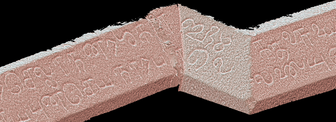
It is a Tamil inscription in the Tamil Language and the characters are both in Tamil and Grantha and is paleographically dated to 16th century CE. It is a rather unique inscription recorded in the place as the text seems like a personal note, it records that a Singaperumal nambiyar had 15 vattam lands, of which, 5 nalayarar was given to Allappan and brothers as crop produce by Ragavar and Sokkappan. The Quarterly Journal of The Mythic Society has documented and published this inscription.[8]

Discovery and dating
[edit]In April 2022, the Mythic Society Bengaluru Inscriptions 3D Digital Conservation Project team identified the inscription in the temple and 3D scanned it. The inscription was subsequently read by Soundari Rajkumar and Pon Karthikeyan using the digital images produced from the scan.
Characteristics
[edit]
The inscription stone measures 16 cm high by 311 cm wide. while the characters are approximately 4.4 cm tall, 5.5 cm wide, and 0.3 cm deep.
Transliteration
[edit]| Line
Number |
Tamil | IAST | Kannada Transliteration |
|---|---|---|---|
| 1 | வியய வருஷம் ஆடி மாதம் சாலத்தல் காணியில் சிங்கப்பெருமாள் நம்பியார் க்ஷேத்ரம் பதினைஞ்சு வட்டம். யிதில் யிராகவ‑ | viyaya varuṣam āṭi mātam cālattal kāṇiyil ciṅkappĕrumāl̤ nampiyār kṣetram patiṉaiñcu vaṭṭam. yitil yirākava‑ | ವಿಯಯ ವರುಷಂ ಆಟಿ ಮಾತಂ ಚಾಲತ್ತಲ್ ಕಾಣಿಯಿಲ್ ಚಿಂಕಪ್ಪೆರುಮಾಳ್ ನಂಪಿಯಾರ್ ಕ್ಷೇತ್ರಂ ಪತಿನ಼ೈಂಚು ವಟ್ಟಂ. ಯಿತಿಲ್ ಯಿರಾಕವ‑ |
| 2 | ரும் சொக்கப்பனும் அல்லப்பநுக்கும் தம்பிமாக்கும் ஐஞ்சு நாளயாரர் பூக்தமாக குடுத்தோம். | rum cŏkkappaṉum allappanukkum tampimākkum aiñcu nāl̤ayārar pūktamāka kuṭuttom. | ರುಂ ಚೊಕ್ಕಪ್ಪನ಼ುಂ ಅಲ್ಲಪ್ಪನುಕ್ಕುಂ ತಂಪಿಮಾಕ್ಕುಂ ಐಂಚು ನಾಳಯಾರರ್ ಪೂಕ್ತಮಾಕ ಕುಟುತ್ತೋಂ. |
It is an incomplete Kannada Inscription and a possible donatory inscription dated to 1328CE as recorded in the inscription itself. The inscription possibly records the donation by a Ponnanna's son Kamana Danayaka. The inscription is inscribed on the wall of the Chokkanathaswamy Temple. This inscription has been documented in Epigraphia carnatica Vol-9.[9]
Physical Characteristics
[edit]The inscription is 21 cm tall and 229 cm wide and the Kannada Characters are 4 cm tall, 5 cm wide & 0.27 cm deep (medium depth).
Transliteration of the text
[edit]The transliteration is published in the Epigraphia carnatica,[9] the text below is rereading published by the Mythic Society. It reads as follows,
| Line
Number |
Kannada | IAST |
|---|---|---|
| ಸ್ವಸ್ತಿಶ್ರೀಮತ್ಪ್ರತಾಪ ಚಕ್ರವರ್ತ್ತಿ ಹೊಯಿಸಳ ಭುಜಬಳ ಶ್ರೀವೀರಬಲ್ಲಾಳ ದೇವರಸರು ಸುಖ ಸಂಕಥಾ ವಿನೋದದಿಂ | svastiśrīmatpratāpa cakravartti hŏyisal̤a ̤ bhujabal̤a śrīvīr ̤ aballāl̤a de ̤ varasaru sukha saṃkathā vinodadiṃ | |
| 1 | ಸ್ವಸ್ತಿಶ್ರೀ ಜಯಾಭ್ಯುದಯಶ್ಚ ಶಕವರುಷ ೧೨೫೧ನೆಯ ವಿಭವ ಸಂವತ್ಸರದ ಆಶ್ವಯಿಜ ಬ೧೧ಶು ದಂದು | svastiśrī jayābhyudayaśca śakavaruṣa 1251nĕya vibhava saṃvatsarada āśvayija ba11śu daṃdu |
| 2 | ಪೊಂನಂಣನವರ ಮಕ್ಕಳು . . . . . . . . . . . . . . . . . . . . | pŏṃnaṃṇanavara makkal̤u k ̤ āmaṃṇa daṃṇāyakaru . . . . . . . . . . . |
| (ಮುಂದೆ ಕಾಣುವುದಿಲ್ಲ) | (rest is not seen) |
It is a Kannada inscription of the 15th century written during the rule of the King Devaraya II of the Karnataka Empire. The inscription precisely mentions the date of the donation being made as "śakhavaruṣa sāvirada mūnnūṟa mūvattanĕya virodhi saṃvatsarada cayitra sudda5so" which is 21 Mar 1409CE in the Julian calendar.
It is a donatory inscription to the deity Chokkanathaswamy by a Nagappa Danayaka whose donation of revenue acquired from a multitude of taxes in Karadiyahalli (not traceable today, There is a possibility that this is Kodihalli which neighbours Domlur today). It mentions Domlur as Domanuru which belonged to the administrative unit of Yelahanka Naadu, one of the administrative units under the Karnataka Empire, Yelahanka Naadu was part of Kelekunda-300 which was in turn part of the bigger administrative unit Gangavaadi-96000.The purpose of this donation was to support the temple's daily pooja rituals and ceremonial offerings.
The significance of the inscription is in its mention of various taxes that were extant during the period, it lists many types of professional, sales and goods taxes that were contributed to the temple like Maggaderre (loom tax), Madu (tax on honey collectors or liquor makers), Bhadagi (tax on carpenters), Kamara (tax on blacksmiths), Aasaga (tax on washermen), Navinda (tax on barbers), Kumbhaara (tax on potters), Maadega (tax on cobblers), Kayigaana & Yettu Gaana (taxes on oil mills, human and ox-powered), Yettu (taxes on oxen), Tottu (taxes on slaves), Bandi (taxes on carts), Kudure Kuli Maarida Shunka (taxes on sale of horses and sheep), Kona (tax on male buffalo), Kuri (tax on sheep), Yemme (tax on female buffalo), Aale (tax on betel leaf or jaggery making), Adeke (tax on arecanut), Maraavali (unclear), Tota (tax on orchards), Tudike (tax on small parcels of land), Akkasale (tax on goldsmiths), Graamagala Olavarru & Horavaru (taxes on import and export goods, including sheep, buffalo, and horses).[9]
Physical Characteristics
[edit]The inscription is inscribed on the temple wall and is 62 cm tall and 208 cm wide. The Kannada Characters are 4 cm tall, 4 cm wide & 0.16 cm deep (shallow depth).
Transliteration of the text
[edit]The transliteration is published in the Epigraphia carnatica.[10] The text below is rereading published by the Mythic Society. It reads as follows,
| Line
Number |
Kannada | IAST |
|---|---|---|
| 1 | 0 ಸ್ವಸ್ತಿ ಶ್ರೀ ಶಖವರುಷ ಸಾವಿರದ ಮೂನ್ನೂಱ ಮೂವತ್ತನೆಯ ವಿರೋಧಿ ಸಂವತ್ಸರದ ಚಯಿತ್ರ ಸುದ್ದ ೫ಸೋ ಸ್ವಸ್ತಿಶ್ರೀ ಮನುಮಹಾರಾಜಾ | 0 svasti śrī śakhavaruṣa sāvirada mūnnūṟa mūvattanĕya virodhi saṃvatsarada cayitra sudda 5so svastiśrī manumahārājā |
| 0 ದೊಮನೂರ . . . | 0 dŏmanūra . . | |
| 2 | ಧಿರಾಜ ರಾಜಪರಮೇಸ್ವರ ಶ್ರೀವೀರಪ್ರಥಾಪ ದೇವರಾಯ ಮಹಾರಾಯರ ಭುಜಪ್ರಥಾಪ ನಾಗಪ್ಪ ದಂಣಾಯ್ಕರು ಎಲಕ್ಕನಾಡು ವೊಳಗೆ | dhirāja rājaparamesvara śrīvīraprathāpa devarāya mahārāyara bhujaprathāpa nāgappa daṃṇāykaru ĕlakkanāḍu vŏl̤ag̤ĕ |
| 3 | ಚೊಕ್ಕನಾಥ ದೇವರಿಗೆ ಸಲುವಂಥಾ ದಿನ ಕಟ್ಟಲೆಯಲು ಕರಡಿಯಹಳಿಯ ಚತುಸ್ಸೀಮೆ ವೊಳಗಾದ ಗ್ರಾಮಗಳಿಗೆ ಸಲುವ ಗ್ರಾಮ೧ | cŏkkanātha devarigĕ saluvaṃthā dina kaṭṭalĕyalu karaḍiyahal̤iy̤ a catussīmĕ vŏl̤ag̤ āda grāmagal̤ig̤ ĕ saluva grāma1 |
| 4 | ಱ ಮಗ್ಗದೆಱೆ ಮದು ಭಡಗಿ ಕಂಮಾಱ ಆಸಗ ನಾವಿಂದ ಕುಂಭಾಱ ಮಾದೆಗ ಕಯೀಗಾಣ ಯೆತ್ತು ಗಾಣ ಎತ್ತುತೊತ್ತು | ṟa maggadĕṟĕ madu bhaḍagi kaṃmāṟa āsaga nāviṃda kuṃbhāṟa mādĕga kayīgāṇa yĕttu gāṇa ĕttutŏttu |
| 5 | 0 ಬಂಡಿ ಕುದುರೆಯ ಕುಳಿಮಾಱಿದ ಶುಂಖ ಕೋಣ ಕುಱಿ ಎಂಮೆ ಆಲೆ ಅಡೆಕೆಯ ಮರವಳಿ . . . . . [ತೋ]ಟ ತುಡಿಕೆ | 0 baṃḍi kudurĕya kul̤imāṟida śuṃkha k ̤ oṇa kuṟi ĕṃmĕ ālĕ aḍĕkĕya maraval̤i . . . . . [t ̤ o]ṭa tuḍikĕ |
| 6 | 0 ಅಕ್ಕಸಾಲೆಱ ಗ್ರಾಮಗಳ ವೊಳವಾಱು ಹೊಱವಾಱು ಮಱು ಕೊಡಗೆ ಕೊಂಡಂತಾ ಎತ್ತು . . . . . ಕುಱಿ ಎಂ | 0 akkasālĕṟa grāmagal̤a v ̤ ŏl̤a̤vāṟu hŏṟavāṟu maṟu kŏḍagĕ kŏṃḍaṃtā ĕttu . . . . . kuṟi ĕṃ |
| 7 | 0 ಮೆ ಕುದುರೆ ವೊಳಗಾದ ಏನುಳಂತಾ ಸುಂಖ ಸ್ವಾಮಿಯ ಮಗದು ವೊಳಗಾದ ಮೇಲ್ಗಾಪಯಿ . . . . ದೇವರ ನಂದಾ | 0 mĕ kudurĕ vŏl̤ag̤ āda enul̤aṃ̤ tā suṃkha svāmiya magadu vŏl̤ag̤ āda melgāpayi . . . . devara naṃdā |
| 8 | 0 ದೀವಿಗೆಗೆ ಧಾರಾಪೂರ್ವ್ವಖವಾಗಿ ಅಚಂದ್ರಾರ್ಕ್ಕಸ್ತಾಯಿಯಾಗಿ ನಡೈಯಲೆಂದು . . . . ಸಾಶನಕೆ | 0 dīvigĕgĕ dhārāpūrvvakhavāgi acaṃdrārkkastāyiyāgi naḍaiyalĕṃdu . . . . sāśanakĕ |
| 9 | 0 ನಾಗಪ್ಪ ದಂಣಾಯ್ಕರ ಬರಹ ಯೀ ಧರ್ಮಕ್ಕೆ ಆವನಾನೊಬ್ಬ ತಪ್ಪಿದರೂ ಗಂಗೆಯ ತಡಿಯ ಕಪಿಲೆ . . . . . . ದಲ್ಲಿ ಹೋ . . | 0 nāgappa daṃṇāykara baraha yī dharmakkĕ āvanānŏbba tappidarū gaṃgĕya taḍiya kapilĕ . . . . . . dalli ho . |
| 10 | ಸ್ವದೆತ್ತಾಂ ಪರದೆತ್ತಾಂ ವಾಯೋಹರೇತ್ತು ವಸುಂಧರ | ಷಷ್ಟಿರ್ವ್ವರುಷ ಸ್ರಹಸ್ರಾಣಿ ವ್ರಿಷ್ಟಾಯಾಂ . . . . . | svadĕttāṃ paradĕttāṃ vāyoharettu vasuṃdhara | ṣaṣṭirvvaruṣa srahasrāṇi vriṣṭāyāṃ . . . . |
It is a Kannada inscription recording the donation of major taxes collected by a Hejjunka tax (major taxlevied on valuable commodities, animals, food grains etc.) officer, one Mallarasa, from villages within Dombalur's boundaries for purpose of morning food offerings to Chokkanathaswamy Temple. It was written during the rule of the King Devaraya II of the Karnataka Empire praying for the stability in the King's rule. The inscription mentions the date of donation as "śakhavaruṣa 1362 raūdri saṃvatsarada bhādrapada ba 7 so" which was Saturday, 17-Sep-1440CE in the Julian calendar. The text states that any individual who violates the grant will be cursed with the same fate as someone who kills a Kapile, an orange-brown sacred cow on the banks of river Ganga. There is also a standard curse in form of a Sanskrit shloka stating that protecting other's donation gives double the merit of protecting one's own donation. Also, anyone dishonouring the donation will be born as a worm and live for sixty thousand years. The inscription was first published in Epigraphia carnatica.[9] Presently, the inscription stands in the left front courtyard of the temple.[11][12]
Physical Characteristics
[edit]The inscription is 170 cm tall, 54 cm wide. The Kannada characters are 3.7 cm tall, 3.4 cm wide & 0.35 cm deep (shallow depth).
Transliteration of the text
[edit]The transliteration is published in the Epigraphia carnatica.[13] The text below is rereading published by the Mythic Society. It reads as follows,
| Line
Number |
Kannada | IAST |
|---|---|---|
| 1 | ಸ್ವಸ್ತಿಶ್ರೀ ಶಖವರು | svastiśrī śakhavaru |
| 2 | ಷ ೧೩೬೨ ರಊದ್ರಿ ಸಂವತ್ಸ | ṣa 1362 raūdri saṃvats |
| 3 | ರದ ಭಾದ್ರಪದ ಬ ೭ ಸೋ | ರಾಜಾ | rada bhādrapada ba 7 so | rājā |
| 4 | ಧಿರಾಜ ರಾಜಪರಮೇಶ್ವರ ಶ್ರೀವೀ | dhirāja rājaparameśvara śrīv |
| 5 | ರದೇವರಾಯ ಮಹಾರಾಯರು ಸ್ತಿ | radevarāya mahārāyaru sti |
| 6 | ರ ಸಿಂಹ್ಹಾಸನಾಱೂಢರಾಗಿ ಯಿ | ra siṃhhāsanāṟūḍharāgi yi |
| 7 | ರಭೇಕೆಂದು ಪಟ್ಟಣದ ರಾಯಂ | rabhekĕṃdu paṭṭaṇada rāyaṃ |
| 8 | ಣಗಳು ಕಳಿಹಿದ ಸೊಂಡೆಯಕೊ | ṇagal̤u kal̤uihida sŏṃḍĕyakŏ |
| 9 | ಪ್ಪದ ವೆಂಠೆಯದ ಹೆಜ್ಜುಂಕದ | ppada vĕṃṭhĕyada hĕjjuṃkada |
| 10 | ಅತಿಕಾರಿ ಮಲ್ಲರಸರು ಡೊಂಬ | atikāri mallarasaru ḍŏṃba |
| 11 | ಲೂರ ಚೊಕ್ಕನಾಥ ದೇವರಿಗೆ ಕೊ | lūra cŏkkanātha devarigĕ kŏ |
| 12 | ಟ್ಟ ದಾನಧಾರೆಯ ಕ್ರಮವೆಂತೆಂ | ṭṭa dānadhārĕya kramavĕṃtĕṃ |
| 13 | ದಡೆ ಪ್ರಾಕಿನಲ್ಲಿ ಸೊಂಡೆಯಕೊಪ್ಪ | daḍĕ prākinalli sŏṃḍĕyakŏppa |
| 14 | ದ ವೆಂಟೆಯಕ್ಕೆ ಆರುಬಂದ ಅ | da vĕṃṭĕyakkĕ ārubaṃda a |
| 15 | ಸುಂಕದವರೂ ಆ ಡೊಂಬಲೂ | suṃkadavarū ā ḍŏṃbalū |
| 16 | ರಚೊಕ್ಕನಾತದೇವರಿಗೆ ಸಲು | racŏkkanātadevarigĕ salu |
| 17 | ವಂತಾ ಚತುಸೀಮೆಯಲ್ಲಿ ಉಳಂ | vaṃtā catusīmĕyalli ul̤aṃ |
| 18 | ತಾ ಆವಾವಾ ಗ್ರಾಮಗಳಿಗೆ ಬಹಂ | tā āvāvā grāmagal̤igĕ bahaṃ |
| 19 | ತಾ ಹೆಜ್ಜುಂಕದ ವರ್ತ್ತನೆಯ ಉಡು | tā hĕjjuṃkada varttanĕya uḍu |
| 20 | ಗಱೆಯನೂ ಪೂರ್ವ್ವಮರ್ಯ್ಯ | gaṟĕyanū pūrvvamaryya |
| 21 | ಯಾದೆಯ ಆ ಚಂದ್ರಾರ್ಕ್ಕ ಸ್ತಾ | yādĕya ā caṃdrārkka stā |
| 22 | ಯಿಯಾಗಿ ನಂಮ್ಮ ರಾಯಂಣ | yiyāgi naṃmma rāyaṃṇa |
| 23 | ಯೊಡೆರ್ಯ್ಯಗೆ ಸಕಳ ಸಾಂಬ್ರಾಜ್ಯ | yŏḍĕryyagĕ sakal̤a sāṃbrājya |
| 24 | ವಾಗಿ ಯಿರಬೇಕೆಂದು ನಂ | vāgi yirabekĕṃdu naṃ |
| (ಹಿಂಭಾಗ) | Backside | |
| 25 | ನಂಮ್ಮ ವರ್ತ್ತನೆಯ ಉಡುಗಱೆಯ | naṃmma varttanĕya uḍugaṟĕya |
| 26 | ನು ಚೊಕ್ಕನಾಥ ದೇವರಿಗೆ ಉಷಕ್ಕಾಲದ ಆ | nu cŏkkanātha devarigĕ uṣakkālada ā |
| 27 | ಹಾರಕ್ಕೆ ಧಾರಾಪೂರ್ವ್ವಖವಾಗಿ ಆ | hārakkĕ dhārāpūrvvakhavāgi ā |
| 28 | ಚಂದ್ರಾರ್ಖ್ಖಸ್ತಾಯ್ಯಾಗಿ ದಾರೆಯನೆಱ | caṃdrārkhkhastāyyāgi dārĕyanĕṟa |
| 29 | ದು ಕೊಟ್ಟೆವಾಗಿ ಯೀ ದರ್ಮ್ಮಖ್ಖೆ ಆ | du kŏṭṭĕvāgi yī darmmakhkhĕ ā |
| 30 | ವನಾನೊಬ್ಬ ತಪ್ಪಿದಡೂ ಗಂಗೆ | vanānŏbba tappidaḍū gaṃgĕ |
| 31 | ಯ ತಡಿಯ ಖಪಿಲೆಯ ಕೊಂದ ಪಾ | ya taḍiya khapilĕya kŏṃda pā |
| 32 | ಪದಲ್ಲಿ ಹೋಹರು || ಸುದೆತ್ತಾಂ | padalli hoharu || sudĕttāṃ |
| 33 | ದುಗುಣಂ ಪುಂಣ್ಯಂ ಪರದೆತ್ತಾ | duguṇaṃ puṃṇyaṃ paradĕttā |
| 34 | ನು ಪಾಲನಂ ಪರದೆತ್ತಾಪಹಾರೇ | nu pālanaṃ paradĕttāpahāre |
| 35 | ಣ ಸ್ವದೆತ್ತಂ ನಿಷ್ಪಲಂಬವೇತ್|| | ṇa svadĕttaṃ niṣpalaṃbavet|| |
| 36 | ಸ್ವದೆತ್ತಾಂ ಪರದೆತ್ತಾಂ ವಾಯೋ | ṇa svadĕttaṃ niṣpalaṃbavet|| |
| 37 | ಹರೇತು ವಸುಂಧರಿ ಸಷ್ಟಿರ್ವ್ವರು | haretu vasuṃdhari saṣṭirvvaru |
| 38 | ಷ ಶಹಸ್ರಾಣಿ ವ್ರಿಷ್ಟಾಯಾಂ | ṣa śahasrāṇi vriṣṭāyāṃ |
| 39 | ಜಾಯತೆ ಕ್ರಿಮಿ || ಸುಭಮಸ್ತು | jāyatĕ krimi || subhamastu |
| 40 | ಮಂಗಳ ಮಹಾಶ್ರೀ ಶ್ರೀ ಶ್ರೀ | mangal̤a mahā śrī śrī śrī |
Domlur Chokkanathaswamy Temple North Wall 1302CE Veera Ballala Inscription
[edit]

It is a Tamil Inscription in the Grantha script dated to 20-Feb-1302CE and written in the reign of the Hoysala king Veera Ballala and is a donatory inscription commanded by the king to be standardised which includes loom tax, revenue, customs tax and other taxes to be given to the pooja, food and other offerings and all the taxes and the rights from the dry and wet lands of Domlur excepting the properties of god Somanatha deva to be given to the deity Chokka Perumal. This inscription is one among the other inscriptions in Madivala Someshwara, Gunjur Someshewara, Ivar Kandapura Dharmeshvara, Nandi Kamateshwara, Shivara Gangadareshwara and Dodda Kallahalli temples that was instructed by the Hoysala king Veera Ballala reviewing grants to many temples in the Bengaluru-Kolar region and instructed "standardised" inscriptions to be engraved in those temples. This inscription is mentioned in the Mysore Archeological Report 1911, However the exact text of the inscription has not been published. The Quarterly Journal of The Mythic Society has documented and published this inscription.[14]
Physical Characteristics
[edit]The inscription is engraved on the temple wall and is 19 cm tall & 1658 cm wide. The Grantha characters are 3 cm tall, 3.4 cm wide & 0.3 cm deep.
Transliterations of the text
[edit]The text was published in Quarterly Journal of The Mythic Society, the text reads as follows,[14]
| Line
Number |
Tamil | IAST | Kannada |
|---|---|---|---|
| 1 | ஸ்வஸ்தி ஸ்ரீ ஸ்ரீ மத் ப்ரதாப சக்ரவத்தி ஸ்ரீ ஹொய்சாள வீர வல்லாள தேவந் ஹேஸர குந்தாணி ராஜ்யம் விரிவி நாடு மாசந்தி நாடு முரசு நாடு பெண்ணையாண்டார் மட நாடு ஐம்புழுகூர் நாடு எலவூர் நாடு குவளால நாடு கைவார நாடு சொக்கநாயன் பற்று இலைப்பாக்க நாடு முன்னான எல்லா நாடுகளிலுள்ள தேவஸ்தானங்களில் மடபதிகளுக்கும் ஸ்தானாபதிக்கும் விண்ணப்பஞ் செய்யப் (பெற) கலியுக வருஷம் 3679 இதன் மேற் செல்லா நின்ற ஸகாப்தம் 1224 ஆவது ப்ல வருஷத்து மார்கழி மாஸம் 22 ௳ திங்கட்கிழமை நாள் இந்த ராஜ்யத்து தேவதானந் திருவிடையாட்டம் மடப்புறம் பள்ளிச்சந்தமான தான மாந்யங்களில் இறுக்கும் ஸித்தாயங் காணி | svasti śrī śrī mat pratāpa cakravatti śrī hŏysāl̤a vīra vallāl̤a devan hesara kuṃdāṇi rājyaṃ virivi nāḍu māsaṃti nāḍu murasu nāḍu pĕṇṇaiyāṃḍār maṭa nāḍu aiṃpuḻugūr nāḍu ĕlavūr nāḍu kuval̤āla nāḍu kaivāra nāḍu sŏkkanāyaṉ paṭru ilaippākka nāḍu muṉṉāṉa ĕllā nāḍugal̤ilul̤l̤a devastāṉaṃgal̤il maṭapatigal̤ukkuṃ stāṉāpatigal̤ukkuṃ viṇṇappañ cĕyyap (pĕṟa) kaliyuga varuṣaṃ 3679 idaṉ meṟ sĕllā niṉṟa sakāptaṃ 1224 āvadu pla varuṣattu mārgaḻi māsaṃ 22 tedi tiṃkaṭkiḻamai nāl̤ iṃda rājyattu devadāṉan tiruviḍaiyāṭṭaṃ maḍappuṟaṃ pal̤l̤iccaṃdamāṉa dāṉa mānyaṃgal̤il iṟukkuṃ siddāyaṅ kāṇi | ಸ್ವಸ್ತಿ ಶ್ರೀ ಶ್ರೀ ಮತ್ ಪ್ರತಾಪ ಚಕ್ರವತ್ತಿ ಶ್ರೀ ಹೊಯ್ಸಾಳ ವೀರ ವಲ್ಲಾಳ ದೇವನ್ ಹೇಸರ ಕುಂದಾಣಿ ರಾಜ್ಯಂ ವಿರಿವಿ ನಾಡು ಮಾಸಂತಿ ನಾಡು ಮುರಸು ನಾಡು ಪೆಣ್ಣೈಯಾಂಡಾರ್ ಮಟ ನಾಡು ಐಂಪುೞುಗೂರ್ ನಾಡು ಎಲವೂರ್ ನಾಡು ಕುವಳಾಲ ನಾಡು ಕೈವಾರ ನಾಡು ಸೊಕ್ಕನಾಯನ಼್ ಪಟ್ರು ಇಲೈಪ್ಪಾಕ್ಕ ನಾಡು ಮುನ಼್ನ಼ಾನ಼ ಎಲ್ಲಾ ನಾಡುಗಳಿಲುಳ್ಳ ದೇವಸ್ತಾನ಼ಂಗಳಿಲ್ ಮಟಪತಿಗಳುಕ್ಕುಂ ಸ್ತಾನ಼ಾಪತಿಗಳುಕ್ಕುಂ ವಿಣ್ಣಪ್ಪಞ್ ಚೆಯ್ಯಪ್ (ಪೆಱ) ಕಲಿಯುಗ ವರುಷಂ 3679 ಇದನ಼್ ಮೇಱ್ ಸೆಲ್ಲಾ ನಿನ಼್ಱ ಸಕಾಪ್ತಂ 1224 ಆವದು ಪ್ಲ ವರುಷತ್ತು ಮಾರ್ಗೞಿ ಮಾಸಂ 22 ತೇದಿ ತಿಂಕಟ್ಕಿೞಮೈ ನಾಳ್ ಇಂದ ರಾಜ್ಯತ್ತು ದೇವದಾನ಼ನ್ ತಿರುವಿಡೈಯಾಟ್ಟಂ ಮಡಪ್ಪುಱಂ ಪಳ್ಳಿಚ್ಚಂದಮಾನ಼ ದಾನ಼ ಮಾನ್ಯಂಗಳಿಲ್ ಇಱುಕ್ಕುಂ ಸಿದ್ದಾಯಙ್ ಕಾಣಿ |
| 2 | க்கை தறியிறை கட்டாரப்பாட்டம் சாரி(கை)யுட்பட்ட பல வரிவுகளும் மற்றுமெப்பேற்பட்ட இறைகளுந் தவிற்து இந்த விபவங்கள் இந்தந்த தேவர்களுக்கு பூஜைக்கும் அமுதுக்கும் போகங்களுக்கும் திருப்பணிக்கும் தாரா பூ(ர்)ண்ணமாக உதகம் பண்ணிக் குடுத்தோம் இப்படிக்கு இலைப்பாக்க நாட்டுத் தோம்பலூரில் சோமனாத தேவருடைய தேவதானமு மடப்புறமும் நீக்கி யிந்தத் தோம்பலூர் நஞ்சை புன்செய் நாற்பாலெல்லையுஞ் மேநோக்கின மரமும் கீனோக்கின கிணறு மனையும் மனைப்படப்பையு மெப்பேற்பட்ட வுரிமையு மெப்பேற்பட்ட இறைககும் இவ்வூற் பெருமாள் சொக்கப் பெருமாளுக்கு உதகம் பண்ணிக் குடுத்தோம் இந்த விபவம் கொ | kkai taṟiyiṟai kaṭṭārappāṭṭaṃ sāri(gai)yuṭpaṭṭa pala varigal̤uṃ maṭrumĕppeṟpaṭṭa iṟaigal̤uṃn taviṟtu iṃda vibavaṃgal̤ iṃdaṃda devarkal̤ukku pūjaikkuṃ amudukkuṃ bŏgan gal̤ukkuṃ tiruppaṇikkuṃ dārā pū(r)ṇṇamaga udagaṃ paṇṇik kuḍuttoṃ ippaḍikku ilaippākka nāṭṭud dŏṃbalūril somaṉāta devaruḍaiya devadāṉamu maḍappuṟamuṃ nīkki yiṃdda dŏṃbalūr naṃcai puṉcĕy nāṟpālĕllaiyuñ menokkiṉa maramuṃ kīṉokkiṉa kiṇaṟu maṉaiyuṃ maṉaippaḍappaiyu mĕppeṟpaṭṭa vurimaiyu mĕppeṟpaṭṭa iṟaigaluṃ ivvūṟ pĕrumāl̤ cŏkkap pĕrumāl̤ukku udagaṃ paṇṇik kuḍuttoṃ iṃda vibavaṃ kŏ | ಕ್ಕೈ ತಱಿಯಿಱೈ ಕಟ್ಟಾರಪ್ಪಾಟ್ಟಂ ಸಾರಿ(ಗೈ)ಯುಟ್ಪಟ್ಟ ಪಲ ವರಿಗಳುಂ ಮಟ್ರುಮೆಪ್ಪೇಱ್ಪಟ್ಟ ಇಱೈಗಳುಂನ್ ತವಿಱ್ತು ಇಂದ ವಿಬವಂಗಳ್ ಇಂದಂದ ದೇವರ್ಕಳುಕ್ಕು ಪೂಜೈಕ್ಕುಂ ಅಮುದುಕ್ಕುಂ ಬೊಗನ್ ಗಳುಕ್ಕುಂ ತಿರುಪ್ಪಣಿಕ್ಕುಂ ದಾರಾ ಪೂ(ರ್)ಣ್ಣಮಗ ಉದಗಂ ಪಣ್ಣಿಕ್ ಕುಡುತ್ತೋಂ ಇಪ್ಪಡಿಕ್ಕು ಇಲೈಪ್ಪಾಕ್ಕ ನಾಟ್ಟುದ್ ದೊಂಬಲೂರಿಲ್ ಸೋಮನ಼ಾತ ದೇವರುಡೈಯ ದೇವದಾನ಼ಮು ಮಡಪ್ಪುಱಮುಂ ನೀಕ್ಕಿ ಯಿಂದ್ದ ದೊಂಬಲೂರ್ ನಂಚೈ ಪುನ಼್ಚೆಯ್ ನಾಱ್ಪಾಲೆಲ್ಲೈಯುಞ್ ಮೇನೋಕ್ಕಿನ಼ ಮರಮುಂ ಕೀನ಼ೋಕ್ಕಿನ಼ ಕಿಣಱು ಮನ಼ೈಯುಂ ಮನ಼ೈಪ್ಪಡಪ್ಪೈಯು ಮೆಪ್ಪೇಱ್ಪಟ್ಟ ವುರಿಮೈಯು ಮೆಪ್ಪೇಱ್ಪಟ್ಟ ಇಱೈಗಲುಂ ಇವ್ವೂಱ್ ಪೆರುಮಾಳ್ ಚೊಕ್ಕಪ್ ಪೆರುಮಾಳುಕ್ಕು ಉದಗಂ ಪಣ್ಣಿಕ್ ಕುಡುತ್ತೋಂ ಇಂದ ವಿಬವಂ ಕೊ |
| 3 | ண்டு திருவாராதனையும் திருப்பொன் கம்ம.... கங்களுந் திருப்பணியும் குறைவற நடத்தி நமக்கும் நம் ராஜ்யத்துக்கும் அற பூதையமாக வாழ்த்தி ஸுகமேயிருப்பது | ṇṭu tiruvārādaṉaiyuṃ tiruppŏṉ kamma.... kaṃgal̤ukun tiruppaṇiyuṃ kuṟaivaṟa naḍatti namakkuṃ naṃ rājyattukkuṃ aṟa pūtaiyamāga vāḻtti sugameyiruppatu | ಣ್ಟು ತಿರುವಾರಾದನ಼ೈಯುಂ ತಿರುಪ್ಪೊನ಼್ ಕಮ್ಮ.... ಕಂಗಳುಕುನ್ ತಿರುಪ್ಪಣಿಯುಂ ಕುಱೈವಱ ನಡತ್ತಿ ನಮಕ್ಕುಂ ನಂ ರಾಜ್ಯತ್ತುಕ್ಕುಂ ಅಱ ಪೂತೈಯಮಾಗ ವಾೞ್ತ್ತಿ ಸುಗಮೇಯಿರುಪ್ಪತು |
Translation
[edit]The text has been published in Epigraphia carnatica Volume 9. it reads as follows,
"Salutation ! In the reign of hoysala king Veera vallaala deva, As per the requests to the all the head of temples and monasteries of the Hesara kundani kingdom, virivi naadu, maasanthi naadu, murasu naadu, pennaiyandar mada naadu, Aimpuzhugur naadu, elavur naadu, kuvalaala naadu, kaaivaara naadu, ilaipakka naadu (Properties of chokka natha)
In kaliyuga year 3679, saka year 1224 margazhi month 22nd day, monday, all the taxes from the temple lands (devadana - shiva, thiruvidaiyattam - vishnu, pallichandam - buddhist and jain) including loom tax, revenue, customs tax and other taxes are to be given to the pooja, food and others offerings to the gods of the respective temples. In thombalur all the taxes and the rights from the dry and wet lands expect of the somanatha deva's properties are given to the chokka perumaal. It includes all the trees, wells, plots within the boundary of the land, with this revenue all the worships and renovations of the temple should be performed without any issues"
Domlur Chokkanathaswamy Temple 16th-century CE Marappillai Suryappan Fragmented Left & Right Pillar Inscription
[edit]

These are a set of 2 Tamil inscriptions engraved on two pillars in the Chokkanathaswamy Temple with the same text and is palaeographically dated to 16th-century. It mentions the two pillars as donated by a merchant Marappillai Suriyappan. The Quarterly Journal of The Mythic Society has documented and published this inscription.[14]
Physical Characteristics
[edit]The inscription is 54 cm tall & 43 cm wide. The Tamil characters are 2.5 cm tall, 2.6 cm wide & 0.25 cm deep.
Transliteration of the Text
[edit]The text is published in the Quarterly Journal of the Mythic society.
| Line
number |
Tamil | IAST | Kannada |
|---|---|---|---|
| 1 | பெருவாணியந் மாரப் | pĕruvāṇiyan mārap | ಪೆರುವಾಣಿಯನ್ ಮಾರಪ್ |
| 2 | பிள்ளை சூரியப் | pil̤l̤ai sūriyap | ಪಿಳ್ಳೈ ಸೂರಿಯಪ್ |
| 4 | பந் தந்மம் | pan danmaṃ | ಪನ್ ದನ್ಮಂ |
| 4 | இதூண் | itūṇ | ಇತೂಣ್ |
| Line
Number |
Tamil | IAST | Kannada |
|---|---|---|---|
| 1 | பெருவாணியந் மாரப் | pĕruvāṇiyan mārap | ಪೆರುವಾಣಿಯನ್ ಮಾರಪ್ |
| 2 | பிள்ளை சூரியப் | pil̤l̤ai sūriyap | ಪಿಳ್ಳೈ ಸೂರಿಯಪ್ |
| 3 | பந் த | pan da | ಪನ್ |
| 4 | ந்மம் | nmaṃ | ದನ್ಮಂ |
| 5 | இதூண் | itūṇ | ಇತೂಣ್ |
Domlur Chokkanathaswamy Temple 16th-century CE Kammanan's Krishna Pillar Fragmented Inscription
[edit]
It is a Tamil inscription in the same script dated paleographically to the 16th Century CE. It records the donation of the pillar by a Kaamanan, son of Vaduga Pillai. The pillar has sculptures of Nartana Krishna, Vishnu and Narasimha. The Quarterly Journal of The Mythic Society has documented and published this inscription.[15]
Physical Characteristics
[edit]The inscription is 43 cm tall & 40 cm wide. The Tamil characters are 2.0 cm tall, 2.5 cm wide & 0.25 cm deep.
Transliteration of the Text
[edit]The text is published in the Quarterly Journal of the Mythic society.
| Line
Number |
Tamil | IAST | Kannada |
|---|---|---|---|
| 1 | இக்கால் | ikkāl | ಇಕ್ಕಾಲ್ |
| 2 | பேறுடை | peṟuḍai | ಪೇಱುಡೈ |
| 3 | யாந் | yān | ಯಾನ್ |
| 4 | காம | kāma | ಕಾಮ |
| 5 | ணன் | ṇaṉ | ಣನ಼್ |
| 6 | தந்ம | danma | ದನ್ಮ |
| 7 | ம் | m | ಮ್ |
| 8 | வடுக | vaḍuga | ವಡುಗ |
| 9 | பிள்ளை | pil̤l̤ai | ಪಿಳ್ಳೈ |
| 10 | மகன் | magaṉ | ಮಗನ಼್ |

It is an incomplete 13th century Tamil Inscription, the context cannot be deduced, "ilaiIapakka nattu Dombaluril Chokkappa Perumal Koyilil" are the only words that can be logically put which translates to "in ilaiIapakka nattu, in dombalur, in the temple of Chokkappa Perumal." It is the only inscription of all those documented in Domlur that is not within the precincts of the Chokkanathaswamy temple. It was first documented and published in the Quarterly Journal of The Mythic Society.[16]
Physical Characteristics
[edit]The inscription is 120 cm tall & 135 cm wide. The Tamil Characters are 6.6 cm tall, 7.8 cm wide & 0.4 cm deep.
Transliteration of the Text
[edit]The text is published in the Quarterly Journal of the Mythic society.[16]
| Line
Number |
Tamil | IAST | Kannada |
|---|---|---|---|
| Side 2 | |||
| 1 | ..கூ சூ | ..kū cū | ..ಕೂ ಚೂ |
| 2 | ..டாமணி ம | .ḍamaṇi ma | .ಡಮಣಿ ಮ |
| 3 | ல ராஜரா | la rājarā | ಲ ರಾಜರಾ |
| 4 | ஜ ரா மலப் | ja rā malap | ಜ ರಾ ಮಲಪ್ |
| 5 | போரு துக | poru tu ga | ಪೋರು ತು ಗ |
| 6 | ண்ட கதந | ṇḍa kadana | ಣ್ಡ ಕದನ |
| 7 | ப்ரசண்ட | pracaṃḍa | ಪ್ರಚಂಡ |
| 8 | ..ண்ட இப | ..ṇṭa ipa | ..ಣ್ಟ ಇಪ |
| 9 | ..ண்ட நேக | ..ṇṭa neka | ..ಣ್ಟ ನೇಕ |
| 10 | .வீரநஸ | .vīranasa | .ವೀರನಸ |
| 11 | ஹாயசுர ஸ | hāyasura sa | ಹಾಯಸುರ ಸ |
| 12 | நிவார ஸிதி | nivāra sidi | ನಿವಾರ ಸಿದಿ |
| 13 | கிரிதுர்கம்மல்ல ஸா | giridurga mmalla ca | ಗಿರಿದುರ್ಗ ಮ್ಮಲ್ಲ ಚ |
| 14 | லடங்க காம | laḍaṃka kā(rā)ma | ಲಡಂಕ ಕಾ(ರಾ)ಮ |
| 15 | ல்ல வீர பக | lla vīra paka | ಲ್ಲ ವೀರ ಪಕ |
| 16 | ண்டிரவ மகர | ṇṭirava makara | ಣ್ಟಿರವ ಮಕರ |
| 17 | ராஜ்ய நிர்மூலந | rājya nirmūlana | ರಾಜ್ಯ ನಿರ್ಮೂಲನ |
| Side 3 | |||
| 18 | (பாண்டிய ராய | (pāṃḍiya rāya | (ಪಾಂಡಿಯ ರಾಯ |
| 19 | குல சமதா) – Stone damaged at top. | kula camatā) – Stone damaged at top. | ಕುಲ ಚಮತಾ) – Stone damaged at top. |
| 19 | குல சமதா) – Stone damaged at top. | kula camatā) – Stone damaged at top. | ಕುಲ ಚಮತಾ) – Stone damaged at top. |
| 20 | ரணி சோ | raṇi co | ರಣಿ ಚೋ |
| 21 | ள ராஜ்ய | l̤a rājya | ಳ ರಾಜ್ಯ |
| 22 | ப்ரதிஷ்டா சா | pratiṣṭā cā | ಪ್ರತಿಷ್ಟಾ ಚಾ |
| 23 | ய்ய நிஸ்ஸங் | yya nissaṃ | ಯ್ಯ ನಿಸ್ಸಂ |
| 24 | க ப்ரதாப ச்ச | ka pratāpa cca | ಕ ಪ್ರತಾಪ ಚ್ಚ |
| 25 | க்ரேவத்தி | krevatti | ಕ್ರೇವತ್ತಿ |
| 26 | போஶள வீ | pośal̤a vī | ಪೋಶಳ ವೀ |
| 27 | ர ராமனா தே | ra rāmaṉā(tha) de | ರ ರಾಮನ಼ಾ(ಥ) ದೇ |
| 28 | வது இலைப் | vatu ilaip | ವತು ಇಲೈಪ್ |
| 29 | பாக்க நாட் | pākka nāṭ | ಪಾಕ್ಕ ನಾಟ್ |
| 30 | டில் தொம்ப | ṭil tŏṃpa | ಟಿಲ್ ತೊಂಪ |
| 31 | லூரில்ச் சொ | lūrilc cŏ | ಲೂರಿಲ್ಚ್ ಚೊ |
| 32 | க்கப்ப பெ | kkappa pĕ | ಕ್ಕಪ್ಪ ಪೆ |
| 33 | ருமாள் கோயிலி நம.. | rumāl̤ koyili nama.. | ರುಮಾಳ್ ಕೋಯಿಲಿ ನಮ.. |
| 34 | மமாகுக | mamākuka | ಮಮಾಕುಕ |
| 35 | இன்னாரது | iṉṉāratu | ಇನ಼್ನ಼ಾರತು |
| Side 4 | |||
| 36 | .......... | .......... | .......... |
| 37 | .......... | .......... | .......... |
| 38 | ...மும் | ...muṃ | ...ಮುಂ |
| 39 | ......ல் பலம் | ......l palaṃ | ......ಲ್ ಪಲಂ |
| 40 | ....ட்டம் | ....ṭṭaṃ | ....ಟ್ಟಂ |
| 41 | . ...த்தா | . ...ttā | . ...ತ್ತಾ |
| 42 | ....லம் | ....laṃ | ....ಲಂ |
| 43 | ...க.. | ...ka.. | ...ಕ.. |
| 44 | ..இப்ப.. | ..ippa.. | ..ಇಪ್ಪ.. |
| 45 | ...தித்தவர.. | ...tittavara.. | ...ತಿತ್ತವರ.. |
| 46 | ...ல் வைத்.. | ...l vait.. | ...ಲ್ ವೈತ್.. |
Domlur Chokkanathaswamy Temple 13th Century CE Alagiyar Inscription
[edit]It is an incomplete Tamil inscription of the 13th century in the Grantha script which is a donatory inscription which records the donation of two door posts made by an Alagiyar to the temple of Sokkapperumal (Chokkanathaswamy Temple). It was published in Volume 9 of Epigraphia carnatica.[17][18]
Transliteration in English
[edit]Source:[18]
The text of transliteration English has been published in Epigraphia carnatica.
"Sokkaperummal ko...kkan....peril....nninen Alagiyar inda-ttiru-nilai-kal irandum ivan tanma."
Translation
[edit]Source:[17]
The text of Translation English has been published in Epigraphia carnatica.
"I, Alagiyar, made in the name of the temple of Sokkapperurnal, These two door-posts are his charity."
Domlur Chokkanathaswamy Temple 1266CE Talaikkatu Iravi Tripurantaka Settiyar Inscription
[edit]It is a Tamil inscription in Grantha characters of 1266CE and a donatory inscription to the god Tripurantaka Perumal by a Talaikkatu Iravi Tripurantaka Settiyar of Tombalur who had constructed the temple to the god Tripurantaka Perumal earlier and donated the wet and dry lands with four boundaries in the village of Jalappalli, the tank at Vinnamangalam and certain other lands below the big tank of Tombalur and gave it to the holder of the temple, one Allala Nambiyar to conduct daily worship and also donated land to Tripurantaka Perumal Achariyan, gave him the right of officiating at consecration of the same temple, and gave him lands, for meeting the expenses of repairs to the temple. 'Tombalur' as mentioned in the inscription is the tamilised form of Domlur and also mentions another name of Domlur as 'desimanickapattanam', Domlur lake mentioned in the inscription might be the land where the TERI building exists today.[19] The text of the same inscription as documented in the Epigraphia carnatica continues further with the text of another possibly unrelated inscription, a donatory inscription by an Allala Nambiyar who made a gift of one-third of his land to Tombalur Savari Perumal Nambiyar.[9][17]
Transliteration of the text in modern English
[edit]The text of the transliteration is published in Epigraphia carnatica Volume 9.[9] The text reads as follows,
"Svasti Sri Sakarai-yandu ayirattu-oru-noorenbadu senra Kshaya-varushattu Sittirai-inadam padinelindiyadi Aditya Hastattu nal Rajendra-Sola-vala-nattu, Ilaippakka-nattu Tombalur ana Desimanikkapattinattu Talaikkattu Yiravi Tripurantaka-settiyarum Parpati-settichchiyarum Nambi Yiravi-settiyarkum Srideviyakkanukkum yi-vanstttil ullarkum punaravrittiy-illamaikkum Tribhuvanamalla Vembi-devarkum yivar varnattil ullarkum tolukkum vajukkum nanr-agavum tiruv-iradanah-gond-aruluvad-aga i-Tripurantaka-settiyar tiru-pratishthai-pannin a nayanar Tripurantakapperumalukku-ttirunamattu-kkaniy-aga vitta Jalappalli nansey punsey nay-pal-ellaiyum Vinnamangalatt-eriyum Torabalur periya yeriyd kalini panniru-kandagamum i-kkovil kaniyalan Iramapiran Allala-nambiyarukku archana-vrtti Vanniyakatta mariyadi-kuduttu kandaga-kolaiyum kuduttu Talai Sankarappariyan Tillai nayagan marumagan Manali Tripurantaka-pperumal-asariyar ivanukku i-ttiru-murram iidaki-prananam aga kshetrara-kudutten pratishthasarimaiyum periy-eri-kil-ppsanam koiai vilaiya aru-kandaga-kkalaniyun-gaudaga-kkollaiyum raajrura ullanavum puduppanikke tiruppadigal opadi kuli idavum ivan makkal makkal santraditya-varai sella kudutten Manali Tripurantaka-perumal-asarikku i-kkoyilir-kaniyalan Kundaaiyir-Kaduvanudaiyan Suriyan Sambandarukku Sanduppatti kalani iru-kandagamum . . . ndalinpatti yiru-kandagamura Uvachchapatti kandagamum eraberuman adiyarku ivv-eriyil kalani aru-kandagam idil terkku kalani kandagamum Sokkaperumal Manikkattukku kandagam i-nnayanar tirumadaivilagamum sannadi-teruvumaga peri-eriyil kalani muppadin-kan. . . . . . . kkaraiyil kurar-pasuvaiyum Piramanaraiyum konra papatte kallum Kaveriyum pullum pumiyura ulladanaiyum Brahma-karppam ulladanaiyum vishthaiyille krimiy-ay senikkakadavvakkal
Allala-nambiyar Tombalur ennudaiya kaniyil Savaripperuraal-nambiyarukku danam aga munrattonru kudutten".
Translation
[edit]The text of the translation is published in Epigraphia carnatica Volume 9 and it reads as follows,[9]
“(On the date specified), I, Talaikkatu Iravi Tripurantaka Settiyar of Tombalur, alias Tesimanikka-pattanam in Ilaippakka-nattu of Rajendra-Sola-vala-nadu, along with (my wife) Parpatisettichchiyar, granted, as tax-free temple property, for the god Tripurantaka-pperumal, set up by myself, — so that he might be worshipped to save from re-birth Nambi Iravi-settiyar, (his wife) Srideviyakka and their descendants, and for victory to the arm and sword of Tribhuvanamalla Vembi-deva and his descendants, the wet and dry lands with their four boundaries in the village of Jalappalli, tlie tank at Vinnamangalam and certain other lands (specified) below the big tank of Tombalur, and made them over, along with some other lands (specified), to the holder of the temple land, Irama-piran Allala-nambiyar, for conducting the worship. I also gave over, with pouring of water, the charge of this temple to Talai Sankarappachariyan Tillainayagan's nephew Manali Tripurantaka-pperumal-achariyan, granted him the right of officiating at consecration, and gave him, for meeting the expenses of repairs to the temple, certain lands (specified) to descend to his sons and grandsons for as long as the moon and the sun exist. Further, I granted certain lands (specified in each case) to the holder of the temple land, Kaduvanudaiyan Suriyan Sambandar, to the temple servants and to Sokkapperumal Manikkam. . . . . . . . .
(Those who violate this charity) shall incur the sin of having slaughtered tawny cows and Brahmans on the banks (of the Ganges), and shall be born worms in ordure for as long as the rocks, the Kaveri, the grass and the earth endure, and the Brahma-kalpa lasts.
I, Allaja-nambiyar, made a gift of one-third of my land in Tombalur to Savari-pperumal-nambiyar".
Domlur Chokkanathaswamy Temple 1290CE Sella Pillai Inscription
[edit]It is a Tamil inscription in Grantha characters of 1290CE and a donatory inscription which was made by the Hoysala King Veera Ramanada Deva (Veera Ramanatha Deva) to the Chokkanathaswamy Temple on the petition of the residents of Ilaipakka Nadu, a Sella Pillai, the temple-manager Nalandigal Narayana Tadar and other people as the funds were insufficient for the temple management, the king ordered a part of the tax collected by Tombalur given to the temple itself. The Ilaipakka Naadu as mentioned in the inscription was an administrative unit, which presently corresponds to Yelahanka located in North Bengaluru. The inscription is published in the Epigraphia carnatica Volume 9, the present status of the inscription remains unknown.
The transliteration of the inscription is published in the Epigraphia carnatica Volume 9.[9] The text reads as follows,
"svasti . . . . . .ysala-vira-Ramanada-Devarku yandu muppattu-aravadu Arpasi-madam padina. .... tiyadi Ilaippakka-nattu-nattavarum Kanda-chchettiyarum Nam. . . . . . .rum adikari Sellappillaiyum devar sibarittai Tombalur Sokkappe. . . . .kku tirunal-alivukku porad-enru vinnappanyya i-kovilil kkariyan-jeyar Nalandigal Narayana-tadar vinnappan-jeya devarum Tomb. . . r irukkum ponl mudalil pattu ponl mudalil vitten vira-Iramanada-Devarena yi-ttanmatai alivu-seydar undagi Gengai-kkaraiyil kura-ppasuvai konran pavatte pugakadavargal"
Translation
[edit]The translation of the inscription is published in the Epigraphia carnatica Volume 9.[9] The text reads as follows,
"In the 36th year of the reign of Poysala vira-Ramanada-Devar, On a petition being made by the inhabitants of Ilaippakka-nadu, the officer Sella-pillai, the temple-manager Nalandigal Narayana-tadar and some others (named), to the effect that the provision made for the expenses for festivals of the god Sokkapperumal of Tombalur is inadequate, the king remitted (on the date specified) 10 pon out of the amount that was being paid by (the village of) Tombalur. Usual final imprecatory sentence."
Domlur Chokkanathaswamy Temple 14th Century CE Panchala Inscription
[edit]It is a mostly incomplete Tamil inscription in Grantha characters of the carpenters and Panchalas (craftsmen) made in front of the deity Chokkanathaswamy, it is published in Epigraphia carnatica Volume 9, the present status of the inscription remains unknown.
The transliteration of the inscription is published in the Epigraphia carnatica Volume 9.[9] The text reads as follows,
"svasti sri upajivana-katrinam samasta-vrita-vasinam arkkasalam paran-daivam baudyame daiva-sasanam sadhanam rathakaranam etat trailokya-bhushanara samasta-va. . . . . . .ttarum samasta-panchalattarum Sokkapperumal tiru-munbe kuraiv-ara-kkudi sthira-sasanam-panninapadi nadugalil."
Translation
[edit]The translation of the inscription is published in the Epigraphia carnatica Volume 9.[17] The text reads as follows,
"This is the Daiva-sasana of the followers of different callings. This edict of the carpenters is the ornament of the three worlds. . . . . . .
The following is the permanent agreement made by all the Panchalas who had assembled, without a vacancy the assembly, in front of the god Sokkapperumal, In the nadus. . . . . . . "
Domlur Chokkanathaswamy Temple 13th Century CE Talaikkatu Iravi Tripurantaka Settiyar Lamp Inscription
[edit]It is a Tamil inscription in Grantha characters of the 13th Century CE which records a donation of money for two lamps made by a Talaikkatu Iravi Tripurantaka Settiyar to the Chokkanathaswamy Temple. It is published in Epigraphia carnatica Volume 9, the present status of the inscription remains unknown.
The transliteration of the inscription is published in the Epigraphia carnatica Volume 9.[9] The text reads as follows,
"svasti sri Irajaraja-Sola-vala-nattu llaippakka-nattu Tombalur ana Desimanikkapatanattu Tiripurantaka-pperumal Embe-devar kattina kattupadi iratti-madattuku tiru-vilaku pana 5"
Translation
[edit]The translation of the inscription is published in the Epigraphia carnatica Volume 9.[9] The text reads as follows,
"According to the stipulation made by Tripurantaka-perumal Enbe devar of Tombalur, alias Tesimanikka-pattanam, of Ilaippakka-nadu in Irajaraja-Sola-vala-nadu, five panams (are sanctioned) for lamps for two months."
Gallery
[edit]-
Domlur Chokkanathaswamy Temple North Wall
-
3D scanning of the North Wall 1302CE Veera Ballala Inscription (Tamil)
-
Singaperumal Nambiyar Tamil Inscription
-
Kammanan's Krishna Pillar Fragmented Tamil Inscription
-
Kammanan's Krishna Pillar Fragmented Tamil Inscription
-
Marappillai Suryappan Fragmented Right Pillar Tamil Inscription
-
Kammanan's Krishna Pillar inscription Another side vishnu sculpture
-
Kammanan's Krishna Pillar Another side Yoga Narasimha sculpture
-
Domlur 13th-century Vira Ramanathan Pillar Tamil Inscription
-
Domlur 1440CE Malarasa's Donation Inscription
See also
[edit]References
[edit]- ^ Epigraphia Carnatica, Volume 9. Bangalore Mysore Govt. Central Press. 1937. p. 7.
- ^ "Epigraphia carnatica. By B. Lewis Rice, Director of Archaeological Researches in Mysore". Bangalore Mysore Govt. Central Press. 1894.
- ^ Damodaran, Akhila (2017-03-02). "Temple of the beautiful god". The New Indian Express. Retrieved 2024-03-24.
- ^ Srivatsa, Sharath (2022-07-14). "Bengaluru's inscriptions: Footprints of history traced anew". The Hindu. ISSN 0971-751X. Retrieved 2024-03-24.
- ^ "70 years of Independence: A Bengaluru temple's tryst with destiny". The Times of India. 12 August 2017.
- ^ "Quarterly Journal of the Mythic Society (QJMS) VOl 113 2 2022 43 Undocumented Bengaluru Inscriptions". April 2022.
- ^ Mysore Archaeological Reports. Annual Report Of The Archaeological Survey Of Mysore For The Year 1910 To 1911.
- ^ The Mythic Society (April 2022). Quarterly Journal of the Mythic Society (QJMS) VOl 113 2 2022 43 Undocumented Bengaluru Inscriptions.
- ^ a b c d e f g h i j k l Mysore. Dept. of Archaeology; Rice, B. Lewis (Benjamin Lewis); Narasimhacharya, Ramanujapuram Anandan-pillai (1894). Epigraphia carnatica. By B. Lewis Rice, Director of Archaeological Researches in Mysore. Robarts - University of Toronto. Bangalore Mysore Govt. Central Press.
- ^ "Epigraphia Carnatica Vol. 9 Supplement".
- ^ "StoneInscriptionsOfBangalore by Udaya Kumar P.L - Issuu". issuu.com. 2017-08-20. Retrieved 2024-03-25.
- ^ Reading the 1440CE inscription at the Domlur Chokkanathaswamy temple, 4 March 2019, retrieved 2024-03-25
- ^ "Epigraphia carnatica. By B. Lewis Rice, Director of Archaeological Researches in Mysore". Bangalore Mysore Govt. Central Press. 1894.
- ^ a b c Quarterly Journal of the Mythic Society (QJMS) VOl 113 2 2022 43 Undocumented Bengaluru Inscriptions. April 2022.
- ^ The Mythic Society (April 2022). Quarterly Journal of the Mythic Society (QJMS) VOl 113 2 2022 43 Undocumented Bengaluru Inscriptions.
- ^ a b The Mythic Society (April 2022). Quarterly Journal of the Mythic Society (QJMS) VOl 113 2 2022 43 Undocumented Bengaluru Inscriptions.
- ^ a b c d "Epigraphia carnatica. By B. Lewis Rice, Director of Archaeological Researches in Mysore". Bangalore Mysore Govt. Central Press. 1894.
- ^ a b "Epigraphia carnatica. By B. Lewis Rice, Director of Archaeological Researches in Mysore". Bangalore Mysore Govt. Central Press. 1894.
- ^ DHNS. "TERI building sits on Domlur lake: Former chief secy". Deccan Herald. Retrieved 2024-03-24.

